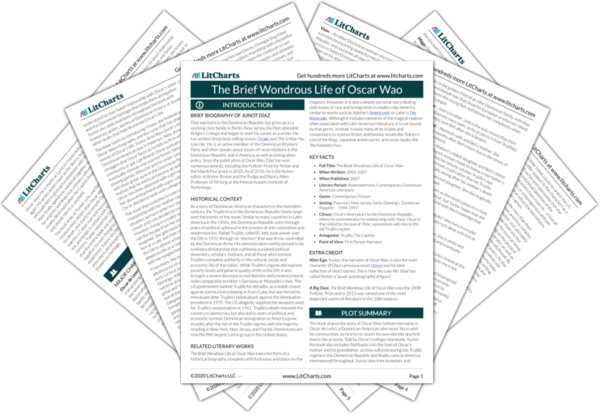The Brief Wondrous Life of Oscar Wao deals with the question of free will, especially as it plays with the Dominican perspective on destiny. In Dominican culture, as portrayed by the novel, humans have very little control over their own lives. Instead, the opposing forces of fukú (curse) and zafa (counter spell) dictate the events in a person’s life. Mankind can only hope to avoid angering fukú, thereby bringing more misfortune, and attempt to lay a zafa to protect themselves and their loved ones. The de León family, Oscar especially, experience the extremes of both of these forces, suffering many incidents of fukú but also experiencing the blessing of zafa over the course of their lives.
Díaz shows both the benefits and the drawbacks of this outlook on free will and destiny, letting the readers form their own opinion. On the one hand, characters who face difficulties, either in the DR or in the United States, are not held responsible for their hardships. On the other hand, the deterministic perspective promotes apathy and resignation in some characters, and a dangerous tendency to lash out in others. Díaz also portrays a range of attitudes concerning fukú, from La Inca—who firmly believes that Trujillo used fukú to harm the Dominican people—to Lola—who tries to live as though her own merits and hard work will be enough to find success. Yunior holds the most complex opinion on fukú, refusing to believe in the supernatural elements of this worldview, but trying to give respect to these forces just in case they are real. Díaz does not argue that the Dominican belief is either wrong or right, leaving it up to the reader to decide whether fukú and zafa are really to blame for all of the events that befall Oscar and his family, or the DR in general.
Though the novel does not argue either for or against belief in destiny, it does maintain that there are good and bad ways to respond to a lack of free will. The novel suggests that the worst choice is to try to become resigned or abusive, because this creates more pain for everyone. It argues that the best path is to accept pain if that is one’s destiny, but choose to hope for blessings even in the difficult times.
Free Will and Destiny ThemeTracker

Free Will and Destiny Quotes in The Brief Wondrous Life of Oscar Wao
For those of you who missed your mandatory two seconds of Dominican history: Trujillo, one of the twentieth century’s most infamous dictators, ruled the Dominican Republic between 1930 and 1961 with an implacable ruthless brutality… At first glance, he was just your prototypical Latin American caudillo, but his power was terminal in ways that few historians or writers have ever truly captured or, I would argue, imagined. He was our Sauron, our Arawn, our Darkseid, our Once and Future Dictator, a personaje so outlandish, so perverse, so dreadful that not even a sci-fi writer could have made his ass up.
It's perfectly fine if you don’t believe in these "superstitions." In fact, it's better than fine—it's perfect. Because no matter what you believe, fukú believes in you.
All those people have families, you can tell by their faces, they have families that depend on them and that they depend on, and for some of them this is good, and for some of them this is bad. But it all amounts to the same shit because there isn’t one of them who is free. They can’t do what they want to do or be who they should be. I might have no one in the world, but at least I'm free. She had never heard anyone say those words. I’m free wasn’t a popular refrain in the Era of Trujillo.
That's the kind of culture I belong to: people took their child's black complexion as an ill omen.
Behold the girl: the beautiful muchachita: Lola's daughter. Dark and blindingly fast: in her great-grandmother La Inca’s words: una jurona. Could have been my daughter if I'd been smart, if I'd been ---. Makes her no less precious. She climbs trees, she rubs her butt against doorjambs, she practices malapalabras when she thinks nobody is listening. Speaks Spanish and English. Neither Captain Marvel nor Billy Batson, but the lightning.
















